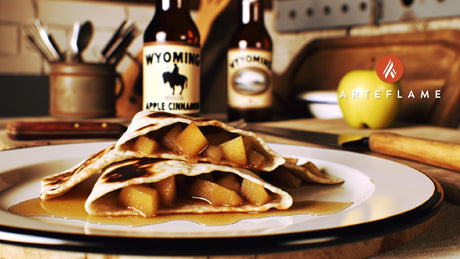Introducción
Descubra la rica tradición culinaria de Pensilvania con estos muslos de pollo en salmuera de pepinillos, asados a la perfección en la parrilla Arteflame, con un jugoso y crujiente acabado. Esta receta combina una sabrosa salmuera, un sellado a alta temperatura al estilo de un asador y los sabores inigualables que solo una sólida plancha de acero puede crear. Ya sea para una reunión en el jardín o una cena familiar informal, estos muslos de pollo seguro que impresionarán.
Ingredientes
- 8 muslos de pollo con hueso y piel
- 2 tazas de salmuera de pepinillos al estilo holandés de Pensilvania (de pepinillos en vinagre)
- 1 cucharada de azúcar moreno
- 1 cucharadita de ajo en polvo
- 1 cucharadita de cebolla en polvo
- 1 cucharadita de pimentón ahumado
- 1 cucharadita de pimienta negra
- 3 cucharadas de mantequilla sin sal (para plancha)
- Perejil fresco picado (opcional, para decorar)
Instrucciones
Paso 1: Encienda la parrilla Arteflame
- Remoje 3 servilletas de papel en aceite vegetal y colóquelas en el centro de la parrilla Arteflame.
- Apila leña seca encima de las servilletas, enciéndelas y deja que el fuego se avive.
- Espere unos 20 minutos a que la parrilla alcance la temperatura máxima. La rejilla central alcanzará más de 535 °C, ideal para sellar.
Paso 2: Marinar el pollo
- En un tazón grande o en una bolsa resellable, agregue los muslos de pollo, la salmuera, el azúcar moreno, el ajo en polvo, la cebolla en polvo, el pimentón y la pimienta negra.
- Selle y refrigere durante 4 a 8 horas (o durante la noche para un sabor más profundo).
Paso 3: Sellar el pollo
- Retire el pollo de la salmuera y séquelo con toallas de papel.
- Coloque cada muslo con la piel hacia abajo sobre la rejilla central de la parrilla durante 2 a 3 minutos para dorarlo y obtener una piel dorada y crujiente.
- Voltee y dore el lado del hueso durante otros 2 minutos.
Paso 4: Terminar la superficie plana de la cocina
- Mueva los muslos sellados a la plancha plana que rodea la rejilla, más cerca del centro para lograr fuego medio-alto.
- Agregue mantequilla debajo y alrededor de cada muslo para obtener un sabor intenso y una cocción uniforme.
- Cocine hasta que la temperatura interna alcance los 71 °C (retírela cuando alcance los 65-78 °C, ya que seguirá cocinándose). El tiempo total de cocción es de unos 12 a 14 minutos.
Paso 5: reposar y servir
- Deje reposar el pollo durante 5 a 10 minutos antes de servir para conservar los jugos.
- Decorar con perejil fresco si se desea.
Consejos
- Retire siempre la carne de la parrilla cuando la temperatura esté 15 °F por debajo de la temperatura deseada.
- La parte superior plana de acero del Arteflame se calienta cerca del centro, lo que permite un control preciso.
- Use mantequilla en la plancha, no solo por el sabor, sino para sellar perfectamente sin quemar los alimentos.
- No enjuague el pollo después de ponerlo en salmuera: la salmuera le aporta sabor por dentro y por fuera.
- Déjelo marinar durante más tiempo (hasta 24 horas) para obtener un sabor a pepinillo aún más pronunciado.
Variaciones
- Salmuera picante de Pensilvania: Agregue 1 cucharada de salsa picante y 1 cucharadita de hojuelas de pimiento rojo a la salmuera para darle un toque picante.
- Glaseado de mostaza y miel dulce: Unte los muslos sellados con una mezcla de miel y mostaza durante los últimos minutos.
- Muslos en salmuera para barbacoa: Cambie la mitad de la salmuera de pepinillos con su salsa de barbacoa estilo Pensilvania favorita.
- Pollo encurtido con hierbas: Añade romero fresco y tomillo a la salmuera para obtener una nota herbácea brillante.
- Arce ahumado: Mezcle 2 cucharadas de jarabe de arce y 1 cucharadita de pimentón ahumado a la salmuera para obtener un sabor más profundo y dulce.
Las mejores combinaciones
- Papas con mantequilla al estilo holandés de Pensilvania a la parrilla sobre una superficie plana
- Judías verdes carbonizadas con ajo y limón
- Pretzels suaves y tibios con salsa de mostaza para mojar
- Cerveza de raíz artesanal o una cerveza lager fresca de Pensilvania
- Pastel de manzana clásico como postre: ¡todo preparado en Arteflame!
Conclusión
Estos muslos de pollo en salmuera de pepinillos holandeses de Pensilvania capturan lo mejor de la parrilla y el sabor regional. Desde la piel sellada y crujiente hasta la carne jugosa y ácida que la envuelve, cada bocado es un homenaje a la tradición y la técnica. Con la parrilla Arteflame, este plato se convierte en un éxito en cada ocasión.
